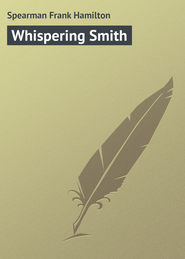По всем вопросам обращайтесь на: info@litportal.ru
(©) 2003-2024.
✖
Nan of Music Mountain
Автор
Год написания книги
2017
Настройки чтения
Размер шрифта
Высота строк
Поля
It need hardly be said that Duke Morgan laid claim also to the Calabasas Spring. But on this the company, being a corporation, fought him. And after somewhat less of argument and somewhat more of siege and shooting, a compromise was reached whereby the company bought annually at an exorbitant price all of Duke, Satterlee, and Vance Morgan’s hay, and as the Morgans had small rivers of water in the mountains, and never, except when crowded, drank water, a modus vivendi was arranged between the claimants. The only sufferer through this was the Mexican publican, who found every Morgan his landlord, and demanding from him tithes over the bar. But force is usually met with cunning, and such Morgans as would not pay in advance at Calabasas, when thirsty, often found the half-mad publican out of goods.
The Calabasas Inn stood in one of the loneliest canyons of the whole seventy miles between Sleepy Cat and Thief River; it looked in its depletion to be what it was, a sombre, mysterious, sun, wind, and alkali beaten pile, around which no one by any chance ever saw a sign of life. It was a ruin like those pretentious deserted structures sometimes seen in frontier towns–relics of the wide-open days, which stand afterward, stark and sombre, to serve as bats’ nests or blind-pigs. The inn at Calabasas looked its part–a haunt of rustlers, a haven of nameless men, a refuge of road-agents.
The very first time de Spain made an inspection trip over the stage line with Lefever, he was conscious of the sinister air of this lonely building. He and Lefever had ridden down from the barn, while their horses were being changed, to look at the place. De Spain wanted to look over everything connected in any way, however remotely, with the operation of his wagons, and this joint, Lefever had told him, was where the freighters and drivers were not infrequently robbed of their money. It was here that one of their own men, Bill McCarty, once “scratched a man’s neck” with a knife–which, Bill explained, he just “happened” to have in his hand–for cheating at cards. Lefever pointed out the unlucky gambler’s grave as he and de Spain rode into the canyon toward the inn.
Not a sign of any sort was displayed about the habitation. No man was invited to enter, no man warned to keep out, none was anywhere in sight. The stage men dismounted, threw their lines, pushed open the front door of the house and entered a room of perhaps sixteen by twenty feet. It had been the original barroom. A long, high, elaborately carved mahogany bar, as much out of keeping as it possibly could be with its surroundings, stretched across the farther side of the room. The left end, as they faced the bar, was brought around to escape a small window opening on a court or patio to the rear of the room. Back of the bar itself, about midway, a low door in the bare wall gave entrance to a rear room. Aside from this big, queer-looking piece of mahogany, the low window at the left end of it, and the low door at the back, the room presented nothing but walls. Two windows flanking the front door helped to light it, but not a mirror, picture, chair, table, bottle, or glass was to be seen. De Spain covered every feature of the interior at a glance. “Quiet around here, John,” he remarked casually.
“This is the quietest place in the Rocky Mountains most of the time. But when it is noisy, believe me, it is noisy. Look at the bullet-holes in the walls.”
“The old story,” remarked de Spain, inspecting with mild-mannered interest the punctured plastering, “they always shoot high.”
He walked over to the left end of the bar, noting the hard usage shown by the ornate mahogany, and spreading his hands wide open, palms down, on the face of it, glanced at the low window on his left, opening on the gravelled patio. He peered, in the semidarkness, at the battered door behind the bar.
“Henry,” observed Lefever, “if you are looking for a drink, it would only be fair, as well as politic, to call the Mexican.”
“Thank you, John, I’m not looking for one. And I know you don’t drink.”
“You want to know, then, where the Mexican keeps his gun?” hazarded Lefever.
“Not especially. I just want to know–”
“Everything.”
“What’s behind the bar. That’s natural, isn’t it?”
Very complete fittings and compartments told of the labor spent in preparing this inner side for the convenience of the bartender and the requirements of exacting patrons, but nothing in the way of equipment, not so much as a pewter spoon, lay anywhere visible.
De Spain, turning, looked all around the room again. “You wouldn’t think,” he said slowly, “from looking at the place there was a road-agent within a thousand miles.”
“You wouldn’t think, from riding through the Superstition Mountains there was a lion within a thousand miles. I’ve hunted them for eleven years, and I never saw one except when the dogs drove ’em out; but for eleven years they saw me. If we haven’t been seen coming in here by some of this Calabasas bunch, I miss my guess,” declared Lefever cheerfully.
The batten door behind the bar now began to open slowly and noiselessly. Lefever peered through it. “Come in, Pedro,” he cried reassuringly, “come in, man. This is no officer, no revenue agent looking for your license. Meet a friend, Pedro,” he continued encouragingly, as the swarthy publican, low-browed and sullen, emerged very deliberately from the inner darkness into the obscurity of the barroom, and bent his one good eye searchingly on de Spain. “This,” Lefever’s left hand lay familiarly on the back of de Spain’s shoulder, “is our new manager, Mr. Henry de Spain. Henry, shake hands with Mexico.”
This invitation to shake hands seemed an empty formality. De Spain never shook hands with anybody; at least if he did so, he extended, through habit long inured, his left hand, with an excuse for the soreness of his right. Pedro did not even bat his remaining eye at the invitation. The situation, as Lefever facetiously remarked, remained about where it was before he spoke, and nothing daunted, he asked de Spain what he would drink. De Spain sidestepped again by asking for a cigar. Lefever, professing he would not drink alone, called for cigarettes. While Pedro produced them, from nowhere apparently, as a conjurer picks cards out of the air, the sound of galloping horses came through the open door. A moment later three men walked, single file, into the room. De Spain stood at the left end of the bar, and Lefever introduced him to Gale Morgan, to David Sassoon, and to Sassoon’s crony, Deaf Sandusky, as the new stage-line manager. The later arrivals lined up before the bar, Sandusky next to Lefever and de Spain, so he could hear what was said. Pedro from his den produced two queer-looking bottles and a supply of glasses.
“De Spain,” Gale Morgan began bluntly, “one of our men was put off a stage of yours last week by Frank Elpaso.” He spoke without any preliminary compliments, and his heavy voice was bellicose.
De Spain, regarding him undisturbed, answered after a little pause: “Elpaso told me he put a man off his stage last week for fighting.”
“No,” contradicted Morgan loudly, “not for fighting. Elpaso was drunk.”
“What’s the name of the man Elpaso put off, John?” asked de Spain, looking at Lefever.
Morgan hooked his thumb toward the man standing at his side. “Here’s the man right here, Dave Sassoon.”
Sassoon never looked a man in the face when the man looked at him, except by implication; it was almost impossible, without surprising him, to catch his eyes with your eyes. He seemed now to regard de Spain keenly, as the latter, still attending to Morgan’s statement, replied: “Elpaso tells a pretty straight story.”
“Elpaso couldn’t tell a straight story if he tried,” interjected Sassoon.
“I have the statement of three other passengers; they confirm Elpaso. According to them, Sassoon–” de Spain looked straight at the accused, “was drunk and abusive, and kept trying to put some of the other passengers off. Finally he put his feet in the lap of Pumperwasser, our tank and windmill man, and Pumperwasser hit him.”
Morgan, stepping back from the bar, waved his hand with an air of finality toward his inoffensive companion: “Here is Sassoon, right here–he can tell the whole story.”
“Those fellows were miners,” muttered Sassoon. His utterance was broken, but he spoke fast. “They’ll side with the guards every time against a cattleman.”
“There’s only one fair thing to do, de Spain,” declared Morgan. He looked severely at de Spain: “Discharge Elpaso.”
De Spain, his hands resting on the bar, drew one foot slowly back. “Not on the showing I have now,” he said. “One of the passengers who joined in the statement is Jeffries, the railroad superintendent at Sleepy Cat.”
“Expect a railroad superintendent to tell the truth about a Calabasas man?” demanded Sassoon.
“I should expect him at least to be sober,” retorted de Spain.
“Sassoon,” interposed Morgan belligerently, “is a man whose word can always be depended on.”
“To convey his meaning,” intervened Lefever cryptically. “Of course, I know,” he asserted, earnest to the point of vehemence. “Every one in Calabasas has the highest respect for Sassoon. That is understood. And,” he added with as much impressiveness as if he were talking sense, “everybody in Calabasas would be sorry to see Sassoon put off a stage. But Sassoon is off: that is the situation. We are sorry. If it occurs again–”
“What do you mean?” thundered Morgan, resenting the interference. “De Spain is the manager, isn’t he? What we want to know is, what you are going to do about it?” he demanded, addressing de Spain again.
“There is nothing more to be done,” returned de Spain composedly. “I’ve already told Elpaso if Sassoon starts another fight on a stage to put him off again.”
Morgan’s fist came down on the bar. “Look here, de Spain! You come from Medicine Bend, don’t you? Well, you can’t bully Music Mountain men–understand that.”
“Any time you have a real grievance, Morgan, I’ll be glad to consider it,” said de Spain. “When one of your men is drunk and quarrelsome he will be put off like any other disturber. That we can’t avoid. Public stages can’t be run any other way.”
“All right,” retorted Morgan. “If you take that tack for your new management, we’ll see how you get along running stages down in this country.”
“We will run them peaceably, just as long as we can,” smiled de Spain. “We will get on with everybody that gives us a chance.”
Morgan pointed a finger at him. “I give you a chance, de Spain, right now. Will you discharge Elpaso?”
“No.”
Morgan almost caught his breath at the refusal. But de Spain could be extremely blunt, and in the parting shots between the two he gave no ground.
“Jeffries put me here to stop this kind of rowdyism on the stages,” he said to Lefever on their way back to the barn. “This is a good time to begin. And Sassoon and Gale Morgan are good men to begin with,” he added.
As the horses of the two men emerged from the canyon they saw a slender horsewoman riding in toward the barn from the Music Mountain trail. She stopped in front of McAlpin, the barn boss, who stood outside the office door. McAlpin, the old Medicine Bend barnman, had been promoted from Sleepy Cat by the new manager. De Spain recognized the roan pony, but, aside from that, a glance at the figure of the rider, as she sat with her back to him, was enough to assure him of Nan Morgan. He spurred ahead fast enough to overhear a request she was making of McAlpin to mail a letter for her. She also asked McAlpin, just as de Spain drew up, whether the down stage had passed. McAlpin told her it had. De Spain, touching his hat, spoke: “I am going right up to Sleepy Cat. I’ll mail your letter if you wish.”
She looked at him in some surprise, and then glanced toward Lefever, who now rode up. De Spain was holding out his hand for the letter. His eyes met Nan’s, and each felt the moment was a sort of challenge. De Spain, a little self-conscious under her inspection, was aware only of her rather fearless eyes and the dark hair under her fawn cowboy hat.
“Thank you,” she responded evenly. “If the stage is gone I will hold it to add something.” So saying, she tucked the letter inside her blouse and spoke to her pony, which turned leisurely down the road.
“I’m trying to get acquainted with your country to-day,” returned de Spain, managing with his knee to keep his own horse moving alongside Nan as she edged away.
She seemed disinclined to answer, but the silence and the awkwardness of his presence drew at length a dry disclaimer: “This is not my country.”
“I understood,” exclaimed de Spain, following his doubtful advantage, “you lived out this way.”










